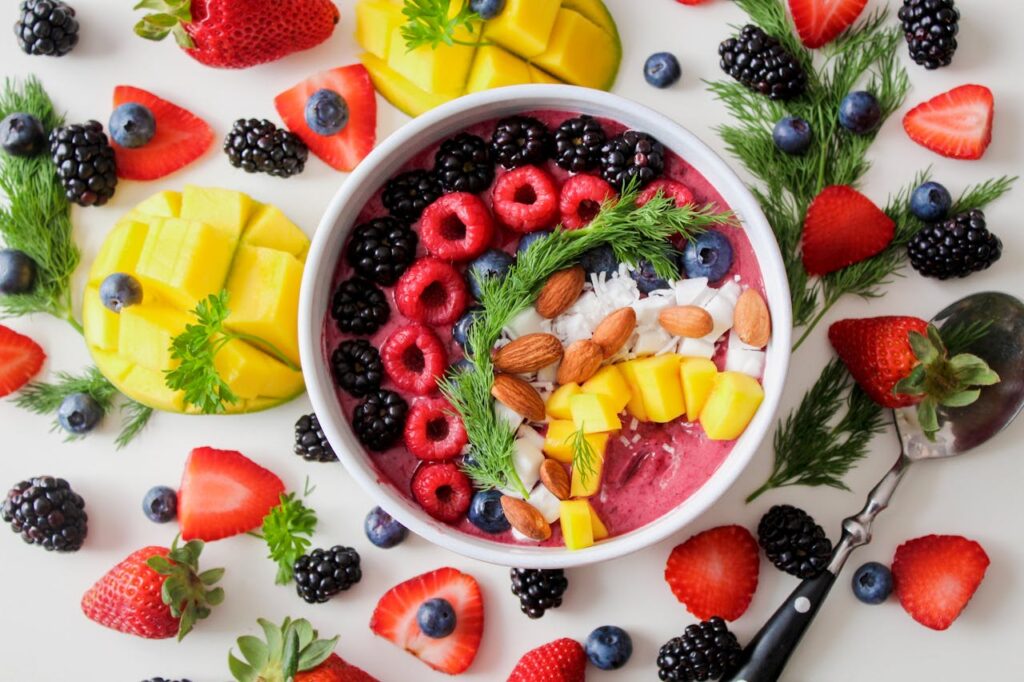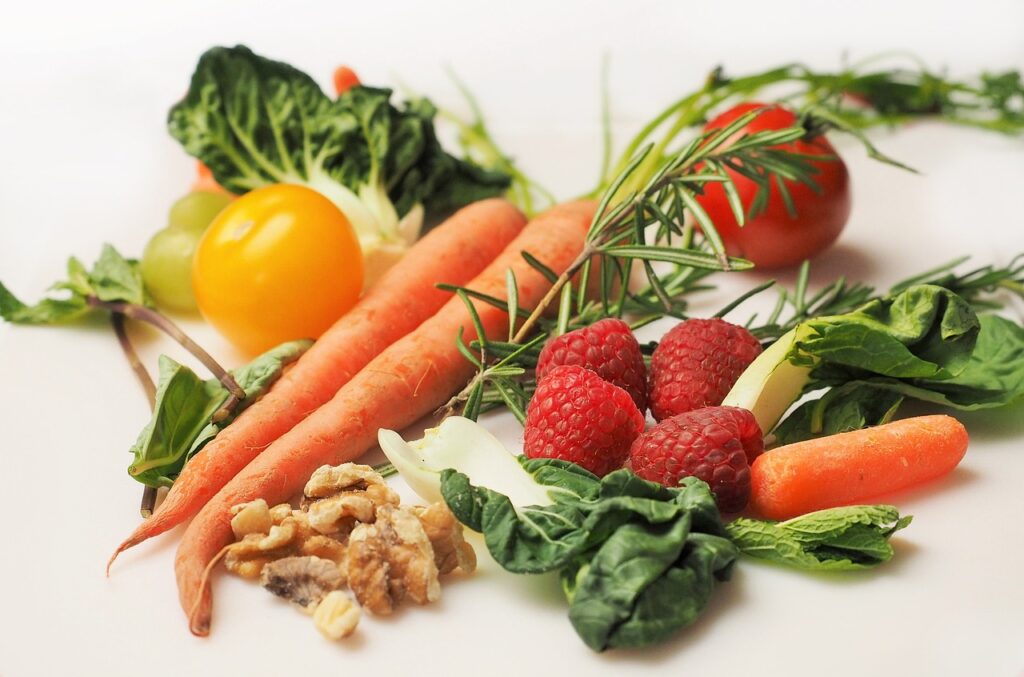Gut healing foods are essential for promoting a healthy digestive system, repairing the gut lining, and maintaining a balanced gut microbiome. Here’s an elaborate guide to foods that can help heal your gut:
1. Probiotic-Rich Foods
These foods contain beneficial bacteria that support a balanced gut microbiome.
• Examples:
• Yogurt (unsweetened, live-culture)
• Kefir
• Sauerkraut
• Kimchi
• Miso
• Tempeh
• Kombucha
Benefits:
• Enhance digestion
• Strengthen the gut lining
• Reduce symptoms of irritable bowel syndrome (IBS)
2. Prebiotic Foods
Prebiotics are types of fiber that feed the beneficial bacteria in your gut.
• Examples:
• Bananas (especially green)
• Garlic
• Onions
• Leeks
• Asparagus
• Chicory root
• Jerusalem artichokes
Benefits:
• Promote the growth of healthy gut bacteria
• Improve nutrient absorption
• Strengthen the immune system
3. Bone Broth
Bone broth is rich in collagen and amino acids like glutamine, which are crucial for repairing the gut lining.
Benefits:
• Soothe inflammation in the digestive tract
• Support leaky gut syndrome recovery
• Provide easily digestible nutrients
4. Fermented Vegetables
Fermentation enhances nutrient content and introduces probiotics.
• Examples:
• Pickles (naturally fermented)
• Fermented beets
• Fermented carrots
Benefits:
• Aid digestion
• Reduce gut inflammation
5. Anti-Inflammatory Foods
These foods help reduce inflammation in the gut lining.
• Examples:
• Turmeric (with black pepper for better absorption)
• Ginger
• Green leafy vegetables (spinach, kale)
• Fatty fish (salmon, mackerel)
Benefits:
• Calm gut irritation
• Protect against chronic inflammation
6. Fiber-Rich Foods
Dietary fiber supports healthy bowel movements and gut bacteria.
• Examples:
• Whole grains (quinoa, oats, brown rice)
• Legumes (lentils, chickpeas)
• Nuts and seeds (chia seeds, flaxseeds, almonds)
Benefits:
• Prevent constipation
• Maintain a balanced microbiome
7. Polyphenol-Rich Foods
Polyphenols are plant compounds that act as antioxidants and support gut bacteria.
• Examples:
• Berries (blueberries, raspberries)
• Green tea
• Dark chocolate (70% or higher cocoa)
• Olive oil
Benefits:
• Encourage the growth of beneficial gut bacteria
• Protect the gut lining
8. Healthy Fats
Healthy fats support the absorption of fat-soluble vitamins and reduce gut inflammation.
• Examples:
• Avocado
• Olive oil
• Coconut oil
• Nuts and seeds
Benefits:
• Protect the gut lining
• Reduce inflammation
9. Foods Rich in Zinc and Vitamin A
These nutrients are vital for gut lining repair and immune function.
• Zinc Sources: Shellfish, pumpkin seeds, eggs
• Vitamin A Sources: Carrots, sweet potatoes, liver
10. Hydrating Foods and Drinks
Hydration is key to gut health.
• Examples:
• Water-rich fruits and vegetables (cucumber, watermelon)
• Herbal teas (peppermint, chamomile)
• Coconut water
Benefits:
• Aid digestion
• Prevent constipation
Foods to Avoid
Certain foods can harm gut health and should be limited:
• Processed foods
• Refined sugars
• Artificial sweeteners
• Alcohol
• Excessive caffeine
Incorporating these foods into your diet can significantly improve your gut health, leading to better digestion, enhanced immunity, and overall well-being.

Probiotic-rich foods are excellent for gut health because they introduce beneficial bacteria (probiotics) into the digestive system. These bacteria help maintain a balanced gut microbiome, which is essential for overall health. Here’s how they benefit the gut:
1. Restore Gut Microbial Balance
• Why it matters: Imbalances in the gut microbiome (dysbiosis) can lead to digestive problems, inflammation, and weakened immunity.
• How probiotics help: Probiotic-rich foods replenish beneficial bacteria, crowding out harmful bacteria and restoring equilibrium.
2. Improve Digestion
• Why it matters: A diverse gut microbiome is essential for breaking down food and absorbing nutrients efficiently.
• How probiotics help: Probiotics enhance the activity of enzymes that digest complex carbohydrates, proteins, and fats, reducing symptoms like bloating and indigestion.
3. Support the Gut Lining
• Why it matters: A healthy gut lining prevents toxins and harmful bacteria from entering the bloodstream (important for preventing leaky gut syndrome).
• How probiotics help: Probiotics produce compounds like short-chain fatty acids (e.g., butyrate) that nourish gut cells and strengthen the intestinal barrier.
4. Enhance Immune Function
• Why it matters: About 70% of the immune system resides in the gut. A healthy gut microbiome is crucial for a strong immune response.
• How probiotics help: Probiotics stimulate immune cells, regulate inflammation, and protect against infections by outcompeting harmful microbes.
5. Reduce Gut Inflammation
• Why it matters: Chronic gut inflammation is linked to conditions like IBS, Crohn’s disease, and ulcerative colitis.
• How probiotics help: Probiotics modulate the immune system, reducing inflammation and calming an overactive immune response.
6. Alleviate Digestive Disorders
• Why it matters: Conditions like IBS, diarrhea, and constipation can significantly impact quality of life.
• How probiotics help: Probiotics improve gut motility, reduce gas production, and regulate bowel movements, alleviating symptoms of these conditions.
7. Promote Mental Health via the Gut-Brain Axis
• Why it matters: The gut and brain are closely connected through the gut-brain axis. An unhealthy gut can contribute to anxiety, depression, and brain fog.
• How probiotics help: Probiotics produce neurotransmitters like serotonin and reduce gut inflammation, positively affecting mood and cognition.
8. Aid in Nutrient Production and Absorption
• Why it matters: Proper absorption of nutrients is essential for overall health.
• How probiotics help: Beneficial bacteria synthesize vitamins (e.g., B vitamins, vitamin K) and improve mineral absorption (e.g., calcium, magnesium).
By regularly consuming probiotic-rich foods, you can maintain a thriving gut microbiome, leading to better digestion, immunity, and overall well-being.

Prebiotic-rich foods play a critical role in gut health by nourishing and supporting the growth of beneficial gut bacteria. Prebiotics are non-digestible fibers and compounds that serve as food for probiotics (beneficial bacteria). Here’s how they help:
1. Feed Beneficial Gut Bacteria
• Why it matters: The gut microbiome thrives when beneficial bacteria have the right nutrients to grow.
• How prebiotics help: Prebiotics like inulin, fructooligosaccharides (FOS), and galactooligosaccharides (GOS) act as a food source for good bacteria, promoting their growth and activity.
2. Enhance Gut Microbiome Diversity
• Why it matters: A diverse microbiome is crucial for resilience against harmful bacteria and better gut function.
• How prebiotics help: Prebiotics encourage the growth of a wide variety of beneficial bacteria, improving the overall balance of the gut microbiota.
3. Promote Production of Short-Chain Fatty Acids (SCFAs)
• Why it matters: SCFAs (like butyrate, acetate, and propionate) are crucial for gut and overall health.
• How prebiotics help: When gut bacteria ferment prebiotics, they produce SCFAs, which:
• Strengthen the gut lining.
• Reduce inflammation in the gut and body.
• Regulate metabolism and blood sugar levels.
4. Improve Digestion and Regularity
• Why it matters: Proper digestion and regular bowel movements are essential for gut health.
• How prebiotics help: Prebiotic fibers improve stool consistency and frequency, preventing constipation and promoting a healthy digestive process.
5. Strengthen the Gut Lining
• Why it matters: A strong gut lining prevents toxins and harmful substances from entering the bloodstream (reducing the risk of leaky gut syndrome).
• How prebiotics help: SCFAs produced by prebiotic fermentation nourish the gut lining and help repair damage.
6. Support Immune Function
• Why it matters: A large portion of the immune system resides in the gut.
• How prebiotics help: They enhance the activity of beneficial bacteria, which produce compounds that modulate immune responses and protect against infections.
7. Reduce Inflammation
• Why it matters: Chronic gut inflammation is linked to conditions like IBS, Crohn’s disease, and metabolic disorders.
• How prebiotics help: Prebiotics reduce inflammation by supporting healthy gut bacteria that produce anti-inflammatory SCFAs.
8. Aid in Nutrient Absorption
• Why it matters: Efficient nutrient absorption is essential for overall health.
• How prebiotics help: Healthy gut bacteria fed by prebiotics improve the absorption of minerals like calcium, magnesium, and iron.
9. Support Mental Health Through the Gut-Brain Axis
• Why it matters: Gut health is closely connected to brain function and mood.
• How prebiotics help: Prebiotics influence the gut-brain axis by improving gut health and increasing the production of mood-regulating neurotransmitters like serotonin.
Examples of Prebiotic-Rich Foods
1. Vegetables:
• Garlic
• Onions
• Leeks
• Asparagus
• Artichokes
2. Fruits:
• Bananas (especially green or slightly underripe)
• Apples (with the skin)
• Berries
3. Grains and Seeds:
• Oats
• Flaxseeds
• Barley
4. Legumes:
• Lentils
• Chickpeas
• Beans
Key Benefits Summary
• Prebiotic foods feed the probiotics, fostering a healthy and diverse gut microbiome.
• They promote digestion, reduce inflammation, strengthen the gut lining, and support the immune system.
• Regular consumption of prebiotic-rich foods is essential for a thriving gut and overall well-being.
Your gut is the foundation of your overall health, influencing everything from digestion and immunity to mood and energy levels. Nurturing your gut with wholesome, nutrient-rich foods is a powerful act of self-care. Remember, a happy gut means a healthier, more vibrant you. Treat it with kindness, and it will reward you with balance, strength, and resilience every day. Take care of your gut, and it will take care of you!